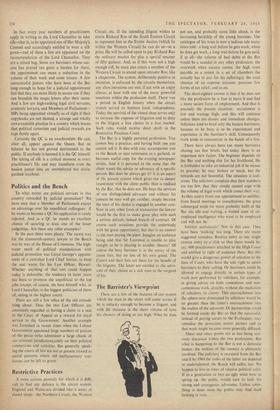The Barrister's Viewpoint
These are a few of the features of our system which the man in the street will conic across if he is unlucky enough to become a litigant, and with the increase in the sheer volume of laws his chances of doing so are high: What he does not see, and probably cares little about, is the increasing hardship of the young barrister. The catalogue of his woes is now a tedious tale many times told: a long wait before he gets work; when he does get work, a long wait before he gets paid, if at all—the volume of bad debts at the Bar would be a scandal in any other profession; the overwork when success comes; the high rents payable as a tenant in a set of chambers (he actually has to pay for his sufferings); the total absence of an expense account; precious few forms of tax relief; and so on.
The short-sighted answer is that if he does not like the profession Ile is free to leave it and find a more secure form of employment. And that is precisely the present situation: recruitment is low and wastage high, and this will continue unless there are drastic and immediate changes. Solicitors tend to brief only the busiest barristers, because to be busy is to be experienced and experience is the barrister's skill. Consequently work tends to concentrate in the hands of a few.
There have always been too many barristers chasing too few briefs, but today there is an important new factor. The beginner depends on the Bar and nothing else for his livelihood. He is forbidden to take an industrial job if he means to practise; he may lecture or teach, but the rewards are not bountiful. The situation is ludi- crous. The solicitors complain that their numbers are too few, that they simply cannot cope with the volume of legal work which comes their way. As they scurry from one appointment to another, from board meetings to consultations, the great submerged tenth (or more probably half) of the Bar sits idle and waiting, a wasted asset- of un- employed intelligence who want to be employed and will not be.
Solvitur antbnlando? Not in this case. They have been 'walking' too long. There arc many suggested remedies. Restrict entry as one might restrict entry to a club so that there would be. say, 600 practitioners attached to the,High Court and entitled to right of audience there. But this would give a dangerous power of selection to the Inns of Court. who have the sole right to admit barristers to their calling. Or barristers could be allowed to engage directly in certain types of work now performed by solicitors, for example, in giving advice on both contentious and non- contentious work. directly, without the mediation of solicitors, to clients. This encroachment into the sphere now dominated by solicitors would he no greater than the latter's encroachment into the realms of the advocate. Or partnerships could be formed inside the Bar so that the successful, instead of paying surtax to the Exchequer. may subsidise the penurious junior partner and so
that work might become more generally diffused.
These and other points are at last being seri- ously discussed within the two professions. But what is happening to the Bar is not a domestic matter; the welfare of the country is ultimately involved. The judiciary is recruited from the Bar and if by 1984 the milks of the latter are depleted or undertalented, the Bench will suffer, too. We
happen to live in times of relative political calm. If in a generation or two an ugly wind were to spring up. the public would turn to look for strong and courageous advocates. Unless some- thing is done soon the public may find itself looking in vain.






































 Previous page
Previous page